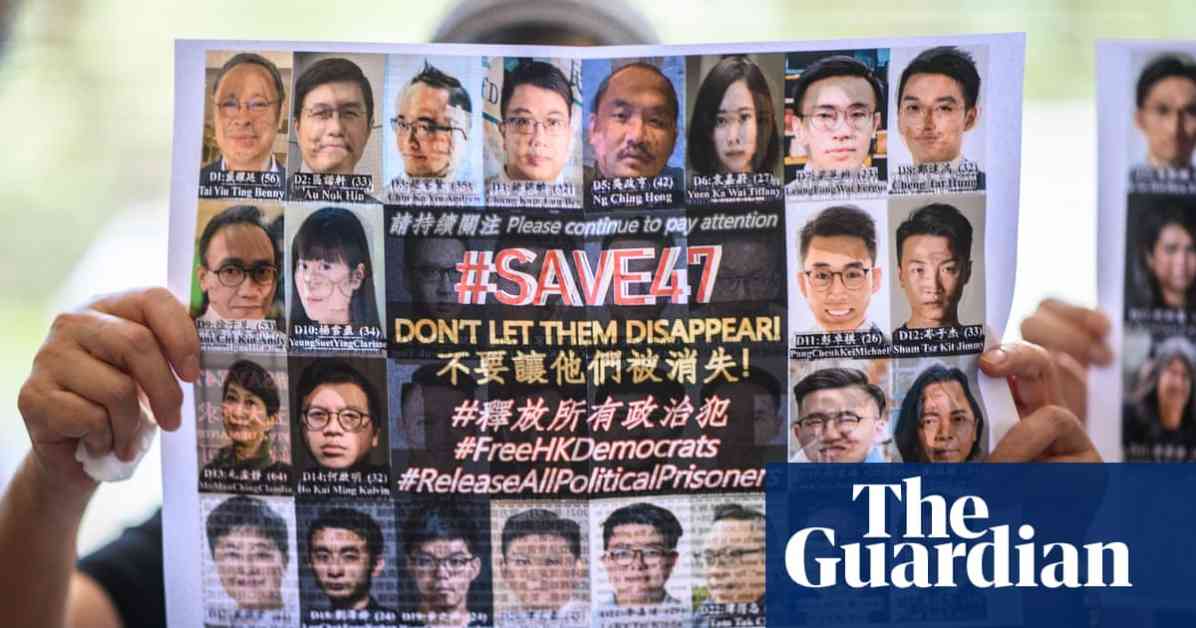A Hong Kong court has sentenced 45 pro-democracy activists to jail terms ranging from four to 10 years in the territory’s largest national security trial, following a prosecution that was widely criticised as politically motivated. Benny Tai, a legal academic and activist, was sentenced to 10 years in jail on Tuesday over his role as an organiser of pre-election primaries that the court found were an attempt to cause a constitutional crisis. Tai’s is the longest sentence handed out so far under the city’s national security law, which was passed in mid- 2020. Joshua Wong, one of the most public faces of the 2019 protest movement, was sentenced to four years and eight months after being given a one-third reduction for pleading guilty. The court said he was an “active participant” in the primaries plan. The judgment also determined he was “not of good character” because of his previous convictions. Wong is already in jail serving sentences for other protest-related charges, but the judges said the additional sentence “would not have a crushing effect on him”. Australian-Hong Kong dual national Gordon Ng was sentenced to more than seven years. Ng was among 16 of the 47 defendants to plead not guilty but was convicted in May. The judges said Ng was “an active participant” and had pressured others to support a plan for the pro-democracy camp to win a majority in the election and use it to block bills and force a dissolution and eventual resignation of the city’s chief executive. He did this by placing advertisements in media, the judgment said. His sentence was reduced by three months for “the possibility that [he] might have been misled” by Tai about the plan’s lawfulness. The men are among 47 people, known as the “Hong Kong 47”, who were charged under the national security law (NSL) over their involvement in a primary election held in 2020 ahead of the Hong Kong general election. They had hoped to win a majority in Hong Kong’s legislature and use it to push for pro-democracy aims. Most have spent more than three years in jail already, but none were released on Tuesday. Those who pleaded not guilty were given harsher sentences. The case is the largest by number of defendants since the NSL was passed. The 47 were arrested in early 2021 in a series of dawn raids on homes and offices that shocked the city. Western governments, human rights organisations and legal groups have criticised the prosecution since its beginning, characterising it as a politically motivated attack on the pro-democracy opposition. The Hong Kong 47 are some of the most public faces of the Beijing-led crackdown on dissent and political freedom in Hong Kong. They were activists, legislators, campaigners, and councillors from the pro-democracy camp of Hong Kong’s previously vibrant political scene. In 2020 they held a pre-election primary to choose the strongest candidates to take on the Pro-Beijing establishment at the upcoming Hong Kong general election. It had been done before, but this time came just days after the introduction of the NSL, a sweeping piece of legislation imposed by the Chinese government to criminalise acts of dissent, sedition, and foreign collusion. The group aimed to win a majority in Hong Kong’s parliament, the legislative council or LegCo, and use it to block budgetary bills and force the resignation of the chief executive if she did not agree to the pro-democracy movement’s demands. Prosecutors said this plan would undermine the Hong Kong government and create a constitutional crisis. The three government-picked judges who sat on the trial agreed. The judgment said the plan was a violation of Hong Kong’s mini-constitution, the Basic Law, and an act of conspiracy to commit subversion under the NSL. Some of those convicted, like Wong, are already serving time, or have been previously jailed over protest activity. There is intense public interest in the trial in Hong Kong and the queue for members of the public to get inside the West Kowloon magistrates court started over the weekend and numbered several hundred people by Tuesday. Some who had been in the line for a day or more were accused by bystanders of being paid to queue and take a seat ticket but not go into court – a practice that has come under increasing public scrutiny for political cases. On Tuesday morning, vanloads of police patrolled and ushered the crowd into a line that stretched down the block and folded back on itself. Officers were seen searching several people. Dennis, a former district councillor, lined up at 4am to support the convicted, many of them his friends. Dennis has been able to visit some of his friends in jail over the years. “I think quite a number of them are quite depressed about their future. So I think I have to come and give a little support. Further towards the front of the queue, Jerome Lau, 74, said he had visited many of his jailed friends in Stanley prison. “Just for me to wake up early on a rainy day, compared to what they’re suffering inside the prison, it’s nothing at all.” On Wednesday, the jailed media tycoon and pro-democracy activist Jimmy Lai will also testify in his collusion trial, breaking the silence he has kept over five previous trials and almost four years in jail. The charges against Lai – the founder of the now-shuttered popular Chinese-language tabloid Apple Daily – revolve around the newspaper’s articles, which supported the pro-democracy protests and criticised Beijing’s leadership. China and Hong Kong say the security law restored order after the 2019 protests and have warned against “interference” from other countries.
Dozens of Pro-Democracy Activists Jailed in Hong Kong’s Largest National Security Trial












